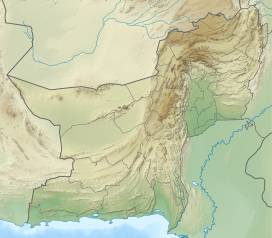Ras Koh Range
This article needs additional citations for verification. (February 2017) |
| Ras Koh Hills | |
|---|---|
| Highest point | |
| Coordinates | 28°49′42.71″N 65°11′41.83″E / 28.8285306°N 65.1949528°E |
| Geography | |
| Location | Balochistan, Pakistan |
The Ras Koh Hills is a range of granite hills forming part of the Sulaiman Mountain Range in the Chagai District in Pakistan's Balochistan province. The word "Ras" means "gateway" and the word "Koh" means "mountain" in Balochi. Ras Koh, therefore, means "Gateway to the Mountains." Pakistan's first nuclear tests were carried out in the Ras Koh Hills on 28th May 1998.
Location

The Ras Koh Hills are situated in the Chagai District of Pakistan's Balochistan province and lie to the south of the Chagai Hills and between the higher Sulaiman Mountains to the northeast and the lower Kirthar Mountains to the southwest.
Topography
Plateaus and basins predominate the Ras Koh Hills with an average elevation of 600 metres, but in areas, the hills can reach elevations up to 3,000 metres. The Ras Koh Hills are composed of granite, are carved out by innumerable channels, but the arid climate restricts rain and for the most part leaves these channels dry. Although little water reaches the low-lying basins, numerous alluvial fans are found in the area.[citation needed]
A structural depression separates the Chagai Hills and the Ras Koh Hills, consisting of flood plains and areas covered with thin layers of salt.
Unlike the Toba Kakar Range to the north-east, which has scattered juniper, tamarisk and pistachio trees, the Ras Koh Hills are largely barren and devoid of vegetation. Most of people in the area, therefore, lead a nomadic life, raising camels, sheep and goats.
Climate
The Ras Koh Hills lie in an arid zone, which is outside the monsoon belt. The Ras Koh Hills receive scanty and irregular rainfall (an average of 4 inches annually). The temperature is extreme: very hot in summer and very cold in winter. The average minimum temperature is 2.4 °C (36.3 °F) in January and the average maximum temperature is 42.5 °C (108.5 °F) in July.
Nuclear tests
Ras Koh Hills was the site of Pakistan's Chagai-I nuclear tests.[1]
References
- ^ The Preparatory Commission for the Comprehensive Nuclear-Test-Ban Treaty Organization (CTBTO). 28 May 1998 - Pakistan Nuclear Tests. https://www.ctbto.org/specials/testing-times/28-may-1998-pakistan-nuclear-testings


